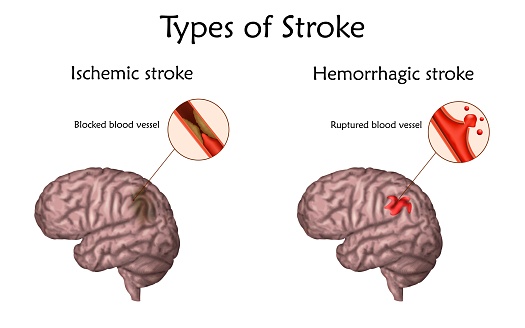- Home
- CVA
CVA
Stroke or CVA in the ICU patient is really a very general term for several different types of brain injury. Often the symptoms may look the same. However the actual causes are different.
These differences affect not only the severity of the stroke; but can also affect recovery and any long term effects.

Ischemic Stroke CVA - No Blood Flow
An Ischemic stroke happens when blood flow is blocked to part of the brain.
Most commonly, the vessels to the brain have chronic changes called plaques. Portions can beak off, travel to the brain, form a clot and block vital blood flow.
The section on Ischemic Stroke explains all this in more detail.
The size of the stroke and the area of the brain involved will the determine the symptoms and their severity.
Likewise, outcome and any long term complications after a CVA are also related to the size and the part of the brain affected.
New treatments are becoming available to better treat these strokes.
Heart-Related Causes of Stroke
Heart problems, such as an irregular heart beat - Atrial Fibrillation - can cause a CVA known as an ischemic stroke.
Atrial fibrillation results in less blood being pumped from the heart with each beat. The blood left behind tends to pool in the heart.
This pooling cause clots to form in the heart cavity, known as the atrium. Parts of these clots can break off and travel from the heart to the brain.
Blood flow to the brain is then blocked, just as described above for the plaques.
The size and location of the blockage determines symptoms and eventual outcome.
Heart valves can also become injured during Sepsis. Bacteria can grow on these valves. They can also break off, and travel directly the brain.
The results and symptoms are the same as when a portion of a blood clot breaks lose. blood clots.
CVA Caused by Bleeding - Brain Hemorrhage
A brain hemorrhage or bleed in general terms is often called a stroke. However it is completely different from a stroke caused by the blood vessel blockage previously described.
Very high blood pressure - Hypertension -can cause a blood vessel in the brain to rupture.
A Brain Aneurysm is a weakening or out-pouching of a blood vessel. This can weaken and suddenly rupture and bleed; even without having high blood pressure.
Patients on blood thinners can suddenly bleed into their brain. This can happen spontaneously or after fall or other event where they hit their head.
The amount of bleeding itself it not enough to cause complications from blood loss. The real damage develops from the blood and clots which form on or in the brain.
The blood and clots increase pressure on the brain. This pressure causes stroke damage because it decreases blood flow to the affected brain area.
The particular area and size of the brain affected will determine the symptoms, outcome and long term complications.
Treatment for these types of brain strokes due to bleeding continues to improve.
Stroke Treatment
Specific treatment for a stroke depends on whether ischemic or from an aneurysm. This is addressed on the pages for each kind of stroke.
Most all strokes require a stay in the ICU.
Aneurysm patients usually have a longer stay because of issues such as vasospasm.
The ICU care can include interventions such as:
- Need for a ventilator
- Blood pressure control
- Correction of heart issues
- Nutrition needs
- Sepsis prevention or treatment
Recovery - Rehabilitation
Stroke recovery is a slow process. It will not be smooth. Improvement will be stop and go.
It may take up to 6 months to obtain all possible recovery.
Larger strokes usually result in some limitation, sometimes very significant.
If your loved has had a stroke severe enough to require ICU care, he or she will almost always need time in a rehabilitation center before being able to go home.
At ICU and hospital discharge, stroke patients will be on new medications to prevent any more strokes.
Questions to Ask
- Is the stroke from a clot or bleeding?
- What led to the stroke?
- Will any procedures or surgery be necessary?
- How much recovery can we expect?
- Will our loved one need to go to a rehab facility?
- Will our loved one wake up from the coma?
- Will he or she be able to speak?
- If a ventilator is necessary, for how long?
- Is another stroke likely?
- Will our loved one be able to care for him or herself or will assistance always be necessary